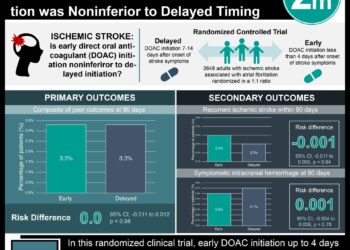ANNEXA-A and ANNEXA-R trials: Andaxanet Alfa for Reversal of Apixaban and Rivaroxaban [Classics Series]
This study summary is an excerpt from the book 2 Minute Medicine’s The Classics in Medicine: Summaries of the Landmark Trials
1. This study determined that andaxanet alfa is effective in reversing anticoagulation by the direct factor Xa inhibitors apixaban and rivaroxaban.
2. No significant thrombotic or bleeding events were associated with andaxanet alfa use.
Original Date of Publication: December 2015
Study Rundown: The ANNEXA-A and ANNEXA-R trials demonstrated the efficacy of andaxanet alfa as a reversal agent for the direct factor Xa inhibitors apixaban and rivaroxaban. Andaxanet was rapid in onset and offset of action, making it ideal for use when urgent reversal of anticoagulation is required. Furthermore, there were no adverse thrombotic or bleeding events in patients receiving andaxanet, thereby supporting its safety profile. This study is strengthened by its inclusion of older participants, who are often excluded from such trials, and as a result more closely approximates clinical practice. Analysis of various biomarkers and measurements of anticoagulation was also very thorough. This study is limited by its small sample size and by its population of only healthy volunteers without significant comorbidities or urgent indications for reversal of anticoagulation. Further study regarding the efficacy and safety of andaxanet is needed in these excluded populations. In summary, the ANNEXA-A and ANNEXA-R trials were among the earliest to demonstrate the efficacy and safety of andaxanet in reversing anticoagulation, and further study could solidify its use as a universal antidote for direct factor Xa inhibitors.
Click to read the study in NEJM
In-Depth [randomized control trial]: The ANNEXA-A and ANNEXA-R trials sought to evaluate the efficacy and safety of andexanet alfa, a recombinant human factor Xa protein, in reversing anticoagulation by the direct factor Xa inhibitors apixaban and rivaroxaban. All participants in both trials were healthy volunteers aged 50-75 and were administered direct factor Xa inhibitors until steady state plasma levels were achieved. The ANNEXA-A trial and ANNEXA-R trials randomized participants to receive either andexanet or placebo for reversal of apixaban (n = 62), and reversal of rivaroxaban (n = 80) respectively. The primary endpoint for both trials was the percent change in anti-factor Xa activity, measured via chromogenic assay of enzyme activity. Secondary end points included the proportion of participants with > 80% reduction in anti-factor Xa activity, changes in biomarkers such as thrombin, and clinical outcomes such as thrombosis and bleeding. Overall, administration of andexanet was associated with a significant reduction in anti-factor Xa activity compared with placebo for both the apixaban (mean [±SD] reduction, 94±2% vs. 21±9%; p < 0.001) and the rivaroxaban (92±11% vs. 18±15%, p < 0.001) groups. All participants receiving the full dose of andexanet had > 80% reversal of anti-factor Xa activity, whereas none receiving placebo did (p < 0.001). Thrombin generation also increased more rapidly in the andexanet group. The duration of anticoagulation reversal was relatively short, with biomarkers returning to placebo levels within 1-3 hours after cessation of andexanet. There were no significant thrombotic or bleeding events.
Siegal DM, Curnutte JT, Connolly SJ, Lu G, Conley PB, Weins BL, et al. Andexanet Alfa for the Reversal of Factor Xa Inhibitor Activity. New England Journal of Medicine. 2015 Dec 17;373(25):2413-24.
©2022 2 Minute Medicine, Inc. All rights reserved. No works may be reproduced without expressed written consent from 2 Minute Medicine, Inc. Inquire about licensing here. No article should be construed as medical advice and is not intended as such by the authors or by 2 Minute Medicine, Inc.






